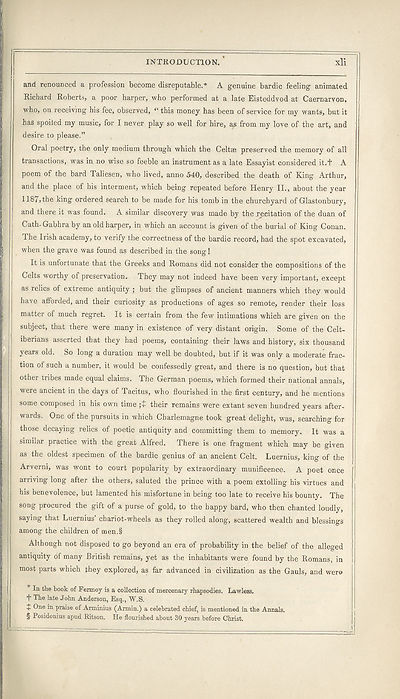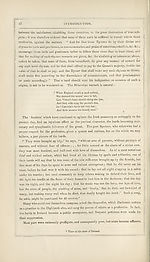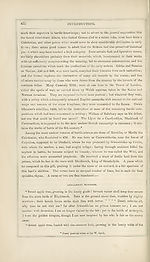Books and other items printed in Gaelic from 1871 to 1900 > Sar-obair nam bard Gaelach, or, The beauties of Gaelic poetry, and lives of the Highland bards
(53) Page xli
Download files
Complete book:
Individual page:
Thumbnail gallery: Grid view | List view

INTRODUCTION.
xli
and renounced a profession become disreputable.* A genuine bardic feeling animated
Richard Roberts, a poor harper, who performed at a late Eisteddvod at Caernarvon,
who, on receiving his fee, observed, “ this money has been of service for my wants, but it
has spoiled my music, for I never play so well for hire, as from my love of the art, and
desire to please.”
Oral poetry, the only medium through which the Celtae preserved the memory of all
transactions, was in no wise so feeble an instrument as a late Essayist considered it.1‘ A
poem of the bard Taliesen, who lived, anno 540, described the death of King Arthur,
and the place of his interment, which being repeated before Henry II., about the year
1187, the king ordered search to be made for his tomb in the churchyard of Glastonbury,
and there it was found. A similar discovery was made by the recitation of the duan of
Cath-Gabhra by an old harper, in which an account is given of the burial of King Conan.
The Irish academy, to verify the correctness of the bardie record, had the spot excavated,
when the grave was found as described in the song 1
It is unfortunate that the Greeks and Romans did not consider the compositions of the
Celts worthy of preservation. They may not indeed have been very important, except
as relics of extreme antiquity; but the glimpses of ancient manners which they would
have afforded, and their curiosity as productions of ages so remote, render their loss
matter of much regret. It is certain from the few’ intimations which are given on the
subject, that there were many in existence of very distant origin. Some of the Celt-
iberians asserted that they had poems, containing their laws and history, six thousand
years old. So long a duration may W'ell be doubted, but if it was only a moderate frac¬
tion of such a number, it would be confessedly great, and there is no question, but that
other tribes made equal claims. The German poems, which formed their national annals,
were ancient in the days of Tacitus, who flourished in the first century, and he mentions
some composed in his own time ;+ their remains were extant seven hundred years after¬
wards. One of the pursuits in which Charlemagne took great delight, was, searching for
those decaying relics of poetic antiquity and committing them to memory. It was a
similar practice with the great Alfred. There is one fragment which may be given
as the oldest specimen of the bardic genius of an ancient Celt. Luernius, king of the
Arverni, was wont to court popularity by extraordinary munificence. A poet once
arriving long after the others, saluted the prince with a poem extolling his virtues and
his benevolence, but lamented his misfortune in being too late to receive his bounty. The
song procured the gift of a purse of gold, to the happy bard, who then chanted loudly,
saying that Luernius’ chariot-wheels as they rolled along, scattered wealth and blessings
among the children of men.§
Although not disposed to go beyond an era of probability in the belief of the alleged
antiquity of many British remains, yet as the inhabitants were found by’ the Romans, in
most parts which they explored, as far advanced in civilization as the Gauls, and were
In the book of Fermoy is a collection of mercenary rhapsodies. Lawless.
'I' The late John Anderson, Esq., W.S.
* One in praise of Arminius (Annin.) a celebrated chief, is mentioned in the Annals.
§ Posidonius apud Ritson. He flourished about 30 years before Christ.
xli
and renounced a profession become disreputable.* A genuine bardic feeling animated
Richard Roberts, a poor harper, who performed at a late Eisteddvod at Caernarvon,
who, on receiving his fee, observed, “ this money has been of service for my wants, but it
has spoiled my music, for I never play so well for hire, as from my love of the art, and
desire to please.”
Oral poetry, the only medium through which the Celtae preserved the memory of all
transactions, was in no wise so feeble an instrument as a late Essayist considered it.1‘ A
poem of the bard Taliesen, who lived, anno 540, described the death of King Arthur,
and the place of his interment, which being repeated before Henry II., about the year
1187, the king ordered search to be made for his tomb in the churchyard of Glastonbury,
and there it was found. A similar discovery was made by the recitation of the duan of
Cath-Gabhra by an old harper, in which an account is given of the burial of King Conan.
The Irish academy, to verify the correctness of the bardie record, had the spot excavated,
when the grave was found as described in the song 1
It is unfortunate that the Greeks and Romans did not consider the compositions of the
Celts worthy of preservation. They may not indeed have been very important, except
as relics of extreme antiquity; but the glimpses of ancient manners which they would
have afforded, and their curiosity as productions of ages so remote, render their loss
matter of much regret. It is certain from the few’ intimations which are given on the
subject, that there were many in existence of very distant origin. Some of the Celt-
iberians asserted that they had poems, containing their laws and history, six thousand
years old. So long a duration may W'ell be doubted, but if it was only a moderate frac¬
tion of such a number, it would be confessedly great, and there is no question, but that
other tribes made equal claims. The German poems, which formed their national annals,
were ancient in the days of Tacitus, who flourished in the first century, and he mentions
some composed in his own time ;+ their remains were extant seven hundred years after¬
wards. One of the pursuits in which Charlemagne took great delight, was, searching for
those decaying relics of poetic antiquity and committing them to memory. It was a
similar practice with the great Alfred. There is one fragment which may be given
as the oldest specimen of the bardic genius of an ancient Celt. Luernius, king of the
Arverni, was wont to court popularity by extraordinary munificence. A poet once
arriving long after the others, saluted the prince with a poem extolling his virtues and
his benevolence, but lamented his misfortune in being too late to receive his bounty. The
song procured the gift of a purse of gold, to the happy bard, who then chanted loudly,
saying that Luernius’ chariot-wheels as they rolled along, scattered wealth and blessings
among the children of men.§
Although not disposed to go beyond an era of probability in the belief of the alleged
antiquity of many British remains, yet as the inhabitants were found by’ the Romans, in
most parts which they explored, as far advanced in civilization as the Gauls, and were
In the book of Fermoy is a collection of mercenary rhapsodies. Lawless.
'I' The late John Anderson, Esq., W.S.
* One in praise of Arminius (Annin.) a celebrated chief, is mentioned in the Annals.
§ Posidonius apud Ritson. He flourished about 30 years before Christ.
Set display mode to:
![]() Universal Viewer |
Universal Viewer | ![]() Mirador |
Large image | Transcription
Mirador |
Large image | Transcription
Images and transcriptions on this page, including medium image downloads, may be used under the Creative Commons Attribution 4.0 International Licence unless otherwise stated. ![]()
| Permanent URL | https://digital.nls.uk/109809709 |
|---|
| Description | Out-of-copyright books printed in Gaelic between 1631 and 1900. Also some pamphlets and chapbooks. Includes poetry and songs, religious books such as catechisms and hymns, and different editions of the Bible and the Psalms. Also includes the second book ever published in Gaelic in 1631. |
|---|

